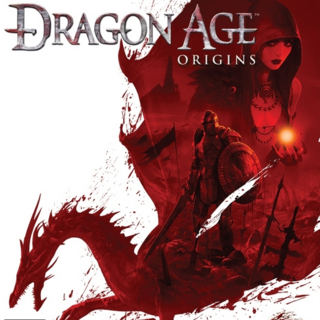Bioware delivers an engaging experience where your actions matter.
In true Tolkien tradition, the tale in Dragon Age is inspired by the real world but it is never commentary. There is an evil force threatening the land of Ferelden and opportunistic nobles are looking to use that danger to rally the people behind them and rise in power. As a warrior burdened with stopping the evil force known as a Blight, the player must put a stop to the civil turmoil first. The story is malleable by the actions of the player (mostly through a dialogue tree), but BioWare has managed to make every outcome a fulfilling and resonating experience. It is an empowering angle to take as compared to other WRPG's like Bethesda's The Elder Scrolls series where the emphasis is always that the game world could always go on without you.
The twist here for the role playing experience is that not only will the player select their playable character's appearance and statistical attributes, but also a little bit about their background before being drafted. Each of the six possible origin stories will last for a couple hours or so out of the approximately 40 hour story, but it establishes your social status for the rest of the game. This tends to manifest itself in how certain characters address you as well as other possible player feedback such as noble connections and the like. No earth shaking stuff here, but people who really want to role play as their character should enjoy the origins system.
You will form your party from a gallery of characters that generally transcend the titles of rogue or hero (although a couple are mere comic relief). Although female characters seem to coincidently all have bodacious bodies (even a self proclaimed old lady...), there is still a lot of good writing behind nearly every character that unfolds before the player through their reactions to major choices, private conversations at camp, and even a little bit of banter as you explore towns. The party you choose will mostly be out of a necessity to fill specific roles in your party, but this wont dampen the experience much because you can't really pick a bad character. Lowering the difficulty level will allow you to pick beyond battle practicality if your heart is set on a particular character. Its a small but welcome concession.
Combat will be a familiar experience, but it is well executed overall. Party members have to stick to their individual roles, which can be fine tuned through AI options, as they work as a team in a tactical manner. The camera perspective is more personal than usual, but this leads to less visibiity of the battle field. A sinking ally health bar can be a good clue that you should go check up on everybody, but prior visual clues such as seeing enemies decend up their target through a camera perspective that overlooks the whole battle field would have been a more practical approach.
Everything fits together nicely. The fact that you are the leader of the party giving orders is reminded to you by a willing line shouted by the character as you switch to them. Although often vague, enemies all have a place in the game world. For instance, you don't just fight a drake enemy out of the blue. You first see their leftovers (livestock corpses) and then stumble upon their holding pens. Also, enemies never respawn which further reinforces the notion that your action always matters even if it just slaying another goblin-like foe. There are a few presentation issues like journal entries that get immediately stuffed away in the menu before they are read or a cinematic camera that sometimes fouls up the composition or flat out misses the shot, but its overall a positive note.
Surpsingly, the weakest point of the game is Inon Zur's score. While its more ambient pieces add mood and atmosphere to exploring the many locales of Ferelden, it often falls flat during the more cinematic moments. Not helping things one bit is an out of place (although surprisingly an original composition) theme song that left a bad, albeit brief, taste in this reviewer's mouth after an otherwise highly enjoyable experience. Voice acting, on the other hand, is solid for such a large undertaking.
Although not every element is as good as it could be, the most important ones are well done and the pieces all fit together for a great whole. When the ending comes, you will think back at all the input you had in the storytelling and marvel at how strong the narrative still managed to be. Then of course, there is the persuasive urge to do it all over again with a new origin story, a new combat class, a new party lineup, and lots of new choices.

